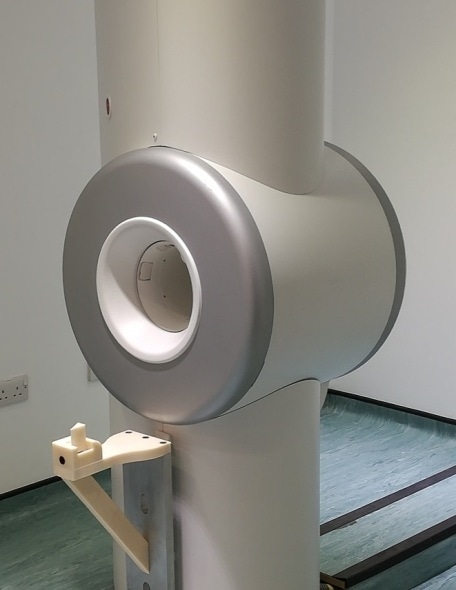The Jessop Wing Maternity Hospital in Sheffield has installed a prototype ‘miniature’ MRI scanner for new born babies - one of only two of its type in the world.

The neonatal MRI scanner at Jessop Wing Hospital
The prototype scanner is part of a two-year research project into the feasibility and benefits of scanning babies in the neonatal unit.
Paul Griffiths, Professor of Radiology at the University of Sheffield and Honorary Consultant at Sheffield Teaching Hospitals NHS Foundation Trust and Martyn Paley, Professor of MR Physics at the University of Sheffield, have been working on the concept and design of the scanner for 12 years. The other has been tested in the United States.
The scanner is considerably smaller than a standard MRI scanner, meaning it can be situated within or close to the neonatal unit.
It enables babies to be scanned on the neonatal unit rather than having to be transported to the main radiology department elsewhere in the hospital, which involves the baby being moved in a specially designed trolley incubator, or via ambulance transfer to Sheffield Children’s Hospital.
It means that scans can be performed more quickly and reduces the risks and difficulties associated with moving and handling vulnerable new born babies, while providing more detailed clinical information than a bedside ultrasound scan. The specialist facilities and care of the neo-natal unit are also close at hand if required.
Susie Thoms' son Toby was scanned as part of the research study after being born at 34 weeks (six weeks premature) by caesarean section and spending a week in neonatal intensive care.
Susie, of Sheffield, said:
Not having to leave the department was a massive advantage, because having to transfer elsewhere at what is already a difficult time, would be a lot of extra stress for Toby, myself and the teams involved.
You can get so much information from the MR images and see incredible detail.
Toby coped with the scan really well and the care he received was absolutely brilliant on the Neonatal Intensive Care Unit and Special Care Baby Unit. I didn't have any hesitation about taking part as I think doing this research, and possibly benefitting other parents and babies in the future, is very important.
Toby is now back home, his feeding tube has recently been removed and he is doing really well.
Professor Griffiths said:
The scanner is much smaller than a standard scanner which enabled us to get it close to the neo-natal unit. The idea is to learn how to use this new scanner to take high-quality images of babies’ brains. So far the quality of the images has got better as we have gone along.
Babies, particularly with brain problems, are unstable – they can stop breathing or their blood pressure can change in an unpredictable way. If that happens it is useful to have neo-natal staff who are used to that situation in such close proximity, which will improve safety. The MR images themselves provide a more detailed image and can help provide a more accurate diagnosis. The motivation to keep going with this project is a belief that at the end we will have something that is better for babies with these types of brain problems.
For the research study, it was initially normal babies that were examined in the new scanner before moving on to premature babies.
The project is a collaboration between Sheffield Teaching Hospitals NHS Foundation Trust, the University of Sheffield, GE Healthcare, and the Wellcome Trust.
If the research is a success, and the quality of the images and data and clinical benefits are proven, it is hoped the scanner will be granted the relevant approvals to enable it to be used on a routine clinical basis in years to come.